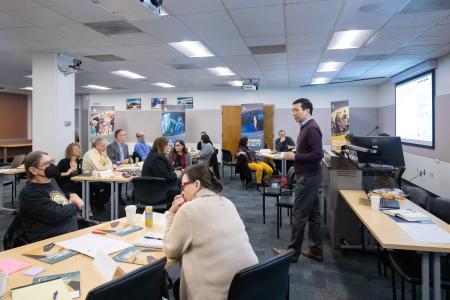Futures-thinking workshops help CSULB be nimble in strategic planning
Imagining the unprecedented challenges and opportunities higher education may face is essential to planning a resilient future for CSULB.
As university leaders work to ensure futures-thinking becomes a core practice in strategic planning and decision-making at CSULB, a series of workshops led by the Institute for the Future kicked off this year with the goal of developing a definitive foresight toolkit at The Beach. Over several weeks, members of the seven Beach 2030 Action Plan teams — as well as campus leaders over CSULB’s physical, financial and No Barriers campaign plans — have committed to attending a workshop to learn foresight skills. Discovering ways to use the practices to build consensus around future goals and identifying new pathways to achieve them are fundamental objectives.

In 2018, Institute for the Future helped CSULB envision the world of 2030, facilitating the online, two-day Imagine: Beach 2030 event that sought input from the entire university community to analyze current trends and signals of change in order to map potential impacts to higher education the ensuing decade might bring. The ideas captured in that full-bodied brainstorm came together in the Beach 2030 strategic plan, a broad vision for the future that articulates the five chief priorities and seven action zones by which CSULB would work to align its services and mission.
As teams comprised of CSULB administrators, faculty, staff and committee partners work to complete Action Plan-aligned projects, IFTF’s training aims to provide tools to enhance their capacity to imagine how CSULB can rise to the challenges and harness the opportunities of the rapidly changing world around it.
Futures-thinking skills taught in the workshops will be compiled into a CSULB-specific foresight toolkit. The goal is to have a singular set of tools for the entire university to draw on to inform strategic planning or simple decision-making with a foresight mindset.
CSULB will utilize these workshops to help build our future ready capacity. Some participants will emerge as “futurists,” equipped to teach others on campus the futures-thinking skills using practices from the toolkit. This central CSULB foresight practitioner team will help energize the campus community to be nimble in future planning.
Some colleges and divisions — including the College of Engineering, the College of Liberal Arts and the Division of Student Affairs — have also opted to participate in a foresight training workshop, as part of specific project planning efforts or to better prepare their services for the future of higher education.
“These workshops are helping our campus community to anticipate the unthinkable and imagine the unimaginable,” said Dhushy Sathianathan, Vice Provost for Academic Planning. “We are glad to see broad participation in these events.”
If your CSULB college, division or department would like to take part in an IFTF training, contact the Beach 2030 team.





